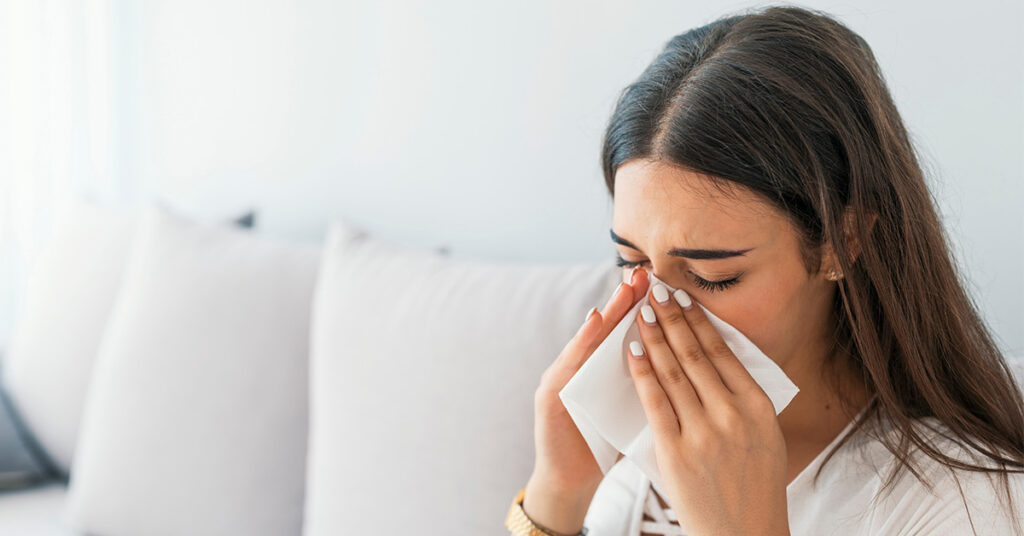
𝐓𝐫𝐞𝐚𝐭𝐢𝐧𝐠 𝐀𝐥𝐥𝐞𝐫𝐠𝐢𝐞𝐬 𝐇𝐨𝐥𝐢𝐬𝐭𝐢𝐜𝐚𝐥𝐥𝐲 𝐭𝐡𝐫𝐨𝐮𝐠𝐡 𝐀𝐲𝐮𝐫𝐯𝐞𝐝𝐚
An allergy is an abnormal immune response to a normally harmless substance, called an allergen. The immune system of a person with allergies reacts to the allergen as if it was harmful, causing a variety of symptoms. Allergies can be mild to severe and can affect many different parts of the body, including the skin, respiratory system, gastrointestinal system, and cardiovascular system.
𝐒𝐲𝐦𝐩𝐭𝐨𝐦𝐬 𝐨𝐟 𝐀𝐥𝐥𝐞𝐫𝐠𝐢𝐞𝐬
Allergies can cause a wide range of symptoms, which can vary in severity and duration depending on the individual and the specific allergen. Some common symptoms of allergies include sneezing, runny or stuffy nose, watery, itchy or red eyes, itchy nose, mouth or throat, skin rashes or hives, coughing, difficulty breathing, wheezing, swelling of the lips, lips, tongue, face or throat etc.
If you experience any of these symptoms after exposure to a particular allergen, it’s important to speak with your doctor to determine the cause and get appropriate treatment. Severe allergies can cause anaphylaxis, a life-threatening reaction that requires immediate medical attention.
𝐂𝐨𝐦𝐦𝐨𝐧 𝐂𝐚𝐮𝐬𝐞𝐬 𝐨𝐟 𝐀𝐥𝐥𝐞𝐫𝐠𝐢𝐞𝐬:-
𝐆𝐞𝐧𝐞𝐭𝐢𝐜𝐬:
A family history of allergies can increase the risk of developing allergies.
𝐄𝐧𝐯𝐢𝐫𝐨𝐧𝐦𝐞𝐧𝐭𝐚𝐥 𝐟𝐚𝐜𝐭𝐨𝐫𝐬:
Exposure to certain allergens, such as pollen or pet dander, can increase the risk of developing allergies.
𝐋𝐢𝐟𝐞𝐬𝐭𝐲𝐥𝐞 𝐟𝐚𝐜𝐭𝐨𝐫𝐬:
Certain lifestyle factors, such as smoking or being overweight, can increase the risk of developing allergies.
𝐀𝐠𝐞: Allergies can develop at any age, but they are more common in children and young adults.
𝐈𝐦𝐦𝐮𝐧𝐞 𝐬𝐲𝐬𝐭𝐞𝐦 𝐝𝐢𝐬𝐨𝐫𝐝𝐞𝐫𝐬:
People with certain immune system disorders, such as autoimmune diseases, are more likely to develop allergies.
𝐒𝐭𝐫𝐞𝐬𝐬: Chronic stress can weaken the immune system, making a person more susceptible to allergies.
𝐀𝐩𝐩𝐫𝐨𝐚𝐜𝐡𝐢𝐧𝐠 𝐀𝐥𝐥𝐞𝐫𝐠𝐲 𝐭𝐡𝐫𝐨𝐮𝐠𝐡 𝐀𝐲𝐮𝐫𝐯𝐞𝐝𝐚
Ayurveda is an ancient system of medicine and according to Ayurveda, allergies are caused by an imbalance in the body’s doshas, or energies. By addressing this imbalance, allergies can be treated holistically. Here are some Ayurvedic approaches to treating allergies and reducing the symptoms:
𝐈𝐝𝐞𝐧𝐭𝐢𝐟𝐲 𝐭𝐡𝐞 𝐚𝐥𝐥𝐞𝐫𝐠𝐞𝐧: The first step in treating allergies is to identify the allergen causing the reaction. This can be done through an allergy test or by paying attention to when and where the symptoms occur.
𝐃𝐞𝐭𝐨𝐱𝐢𝐟𝐢𝐜𝐚𝐭𝐢𝐨𝐧: To remove toxins and balance the doshas, Ayurveda recommends a seasonal cleansing program known as Panchakarma. This involves a series of treatments, including massage, herbal remedies, and enemas.
𝐔𝐬𝐞 𝐡𝐞𝐫𝐛𝐬 𝐚𝐧𝐝 𝐬𝐩𝐢𝐜𝐞𝐬: Ayurveda uses herbs and spices to treat a range of conditions, including allergies. Some of the most commonly used herbs for allergies include turmeric, ginger, holy basil, and licorice.
𝐏𝐫𝐚𝐜𝐭𝐢𝐜𝐞 𝐩𝐫𝐚𝐧𝐚𝐲𝐚𝐦𝐚: Pranayama is a breathing practice that can help to reduce inflammation in the body and improve lung function. This can be especially helpful for those with respiratory allergies.
𝐅𝐨𝐥𝐥𝐨𝐰 𝐚 𝐛𝐚𝐥𝐚𝐧𝐜𝐞𝐝 𝐝𝐢𝐞𝐭: Ayurveda emphasizes the importance of following a balanced diet that is tailored to your individual dosha. This may involve avoiding certain foods that exacerbate your allergies and incorporating foods that help to balance your doshas.
𝐔𝐬𝐞 𝐧𝐞𝐭𝐢 𝐩𝐨𝐭: The neti pot is a traditional Ayurvedic remedy for allergies and sinus problems. It involves using a small pot to pour saline water through the nasal passages to help remove mucus and allergens.
𝐆𝐞𝐭 𝐚𝐝𝐞𝐪𝐮𝐚𝐭𝐞 𝐬𝐥𝐞𝐞𝐩: Adequate sleep is essential for overall health and can help to reduce inflammation in the body. Ayurveda recommends getting seven to eight hours of sleep each night.






